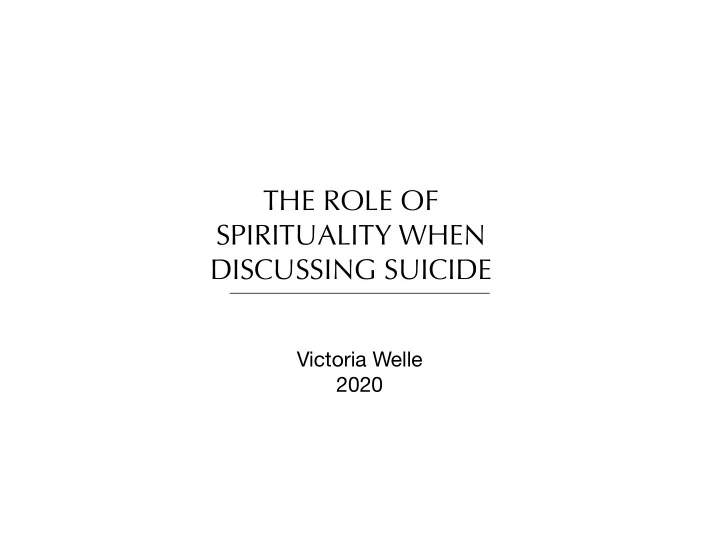

THE ROLE OF SPIRITUALITY WHEN DISCUSSING SUICIDE Victoria Welle 2020
Invitation to Brave Space Together we will create brave space Because there is no such thing as a “safe space” We exist in the real world We all carry scars and we have all caused wounds. In this space We seek to turn down the volume of the outside world, We amplify voices that fight to be heard elsewhere, We call each other to more truth and love We have the right to start somewhere and continue to grow. We have the responsibility to examine what we think we know. We will not be perfect. This space will not be perfect. It will not always be what we wish it to be But It will be our brave space together, and We will work on it side by side By Micky ScottBey Jones
Land Acknowledgement Acknowledgement of the traumatic impact of the suppression of indigenous cultural and religious practices in the United States.
Group agreements • Take care of yourself • Curiosity (not conversion) • Prioritize direct experience in discussion • Pay attention to the tension (notice discomfort without judging it) • No one knows everything, together we know a lot
Introductions My perspectives • trauma survivor, peer supporter • theologian • person of faith, “cultural Catholic” Your perspectives (write in comment) • connection to the topic • faith tradition or current practice
Defining Spirituality “Spirituality is the aspect of humanity that refers to the way individuals seek and express meaning and purpose, and the way they experience their connectedness to the moment, to self, to others, to nature and to the significant or sacred.” (Pulchalski et al, Journal of Palliative Medicine, 2009)
Religion A formalized expression of spirituality that often includes sacred texts, rituals, and rules of conduct. Often practiced in community. Faith Community A formal or informal gathering of people who share a common religion or spirituality. Congregation, sangha, support group, scripture study group, etc
The Role of Culture • Impact of Christianity on culture of United States, even for non-Christians • Spiritual and religious beliefs can become part of individual or group narratives, even in non-religious settings (e.g. “suicide is selfish, sinful, etc”)
Cultural and religious narratives can impact discussions of suicide • “Prosperity gospel” (pressure to be happy, wealthy, successful) • Individualism and self-sufficiency (not asking for help, loss of community) • Growing understanding in faith communities of the impact of trauma, systemic oppression on human suffering
Reflection and Discussion What religious or spiritual messages were you taught about suicide in your faith community and/or culture? Do you find those messages helpful, harmful, or a mixture of both? In discussion, please center the voices of people who have direct experience with suicidal thoughts or as suicide attempt survivors
Telling a Different Story Creating environments where it is okay to talk about deep emotional distress. Reclaiming stories that address suicide and suicidal thoughts in a compassionate way. (example: 1 Kings 19)
Shifting to Saying “Yes” Saying “yes” to spiritual supports that allow people to “seek and express meaning and purpose” and “experience connectedness to the moment to self to others to nature to the significant or sacred” Reflection question: What does this look like in my own life? In the lives of people I care about?
Questions, comments, further discussion
Thank you for your presence here today. Contact me: vic@victoriawelle.com victoriawelle.com
Recommend
More recommend